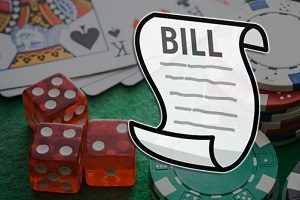Gambling Control Bill 2013
The Gambling Control Act provides for the licensure of certain individuals and establishments involved in various gambling activities, and for the regulation of those activities, by the California Gambling Control Commission. For purposes of the act, existing law defines “key employee” as any natural person employed in the operation of a. The bill, in part, restructures the Remote Caller Bingo Program, reallocates functions among the Commission and the Department of Justice, extends the due date for repayment of loans owed to the Gambling Control Fund for Program administrative costs, appropriates funds to the Commission for workload associated with the Program, and establishes a sunset date for the Program. This bill, additionally, would provide that an amendment of an ordinance increasing by 2 the number of gambling tables that may be operated in a gambling establishment in a city, county, or city and county, above the number of tables authorized by the ordinance in effect on January 1, 2013, may occur only one time. The avoidance of circumstances where gambling could, inadvertently or otherwise, facilitate or enable criminal or illegal activity, consumer choice and protection. (Gambling Control Bill 2013) I expect the gambling sector to commit itself in a meaningful way to the concept and practice of socially responsible gambling – Shatter said.

Minister for Justice and Equality, Alan Shatter TD, announced on 15 July 2013 that the Government had approved the General Scheme of the Gambling Control Bill 2013 which concerns the licensing and regulation of gambling in Ireland. The Scheme has been published and will form the basis of a Bill. Drafting of the actual Bill is to begin right away and it is likely that it will be published in 2014.
If the Gambling Control Bill becomes law, Ireland's existing and outdated legislation for gaming and betting will be replaced with legislation that takes into account the numerous and significant developments in the industry since the current laws were enacted in 1931 and 1956.
Principal Aspects of the Scheme
- The Scheme defines “gambling” as meaning 'gaming; betting; participating in a lottery; participating in a bingo; and amusements'; “gaming” as meaning “playing for a stake a game of chance for a monetary prize or other form of reward, and includes the playing of games available in casinos; and 'remote gambling” as meaning “gambling in which persons participate by the use of remote communication”. “Remote communication” means “communication using the internet, telephone, television, radio or any other kind of electronic or other technology for facilitating communication”.
- The Government plans a unified national regulatory system for gambling and gaming in Ireland.
- A new licensing system will be introduced covering land-based betting and gaming, as before, but it will also extend to casinos and remote gambling.
- A new body called the “Office for Gambling Control, Ireland” (OGCI) will be established. It will issue all new licences and carry out compliance and enforcement activities. The Minister’s executive regulatory functions will be discharged by the OGCI, whilst the Minister will retain responsibility for general policy.
- The OGCI will be situated within the Department of Justice and Equality. Applications will be able to be made for a number of different types of licences including betting and gaming licences, remote and land-based licences. The OGCI will be financed, at least in part, by fees from licence applicants and holders.
- There will be a Social Gambling Fund; created by a levy on operators based on a percentage of their turnover.
- Fixed Odds Betting Terminals (FOBTs) are explicitly prohibited.
- Significantly, the Scheme indicates an intention to remove the prohibition on the enforceability of bets in court: in the future gambling contracts will be enforceable. All operators will welcome this proposal, as there are difficulties in dealing with legal disputes involving these contracts.
- Operators will pay close attention when details of the proposed financial viability tests emerge, as the Scheme anticipates licence holders complying with financial viability tests aimed at ensuring that they have adequate reserves to meet players’ winnings. It also flags that certain licence holders may have to lodge a sum in an Irish bank as security; this security may be used for any fines or financial penalties are imposed on the licence holder.
- The Scheme includes plans for measures to protect vulnerable persons such as age restrictions, staff training, self exclusion, and controls on advertising, promotions and sponsorship.
- The Scheme proposes major changes in relation to bingo and, in particular, separates bingo from lotteries. Under the existing law, bingo is a lottery.
- The Scheme provides that no more than forty casino licences may be in operation at any one time in Ireland. It is reported that there are currently thirty-four private members clubs registered under the present anti-money laundering legislation.
- The Scheme does not deal with taxation. This is dealt with in Section 49 of the Finance Act 2012, which makes arrangements for the extension of the current betting levy to online bets. That section is not yet in force.
Gambling Control Bill 2013 India
When will the Scheme become Law?
Regulation of gambling is a complex area and it is expected that it will take some months to draft a bill from the contents of the Scheme. While there is no official consultation process, parties are welcome to submit comments on the Scheme to the Department of Justice and Equality. Accordingly, it is unlikely that any change in law in Ireland will take place during 2013 or early 2014. We would be happy to assist operators to prepare submissions to the Department, or to provide guidance where they need a more in-depth understanding the plans contained in the Scheme.
Gambling Control Bill 2013 Star


Conclusion
Most interested parties in Ireland have long been in agreement that the current principal gambling laws (which date back to 1931 and 1956) do not adequately address the challenges or opportunities presented by gambling in our time, particularly in terms of technology. We welcome the Gambling Control Bill as it will introduce significant reform through the establishment of a regulatory and licensing regime, but will continue to review and monitor the detail of the proposals as they evolve. We will continue to keep you updated of any major developments. Please contact us if there is a specific area that you would like us to deal with. The full text of the Scheme is available here: http://www.justice.ie/en/JELR/Pages/PB13000296